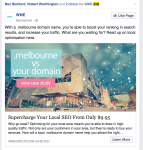Wise words against another additional competing .au extension
http://www.rogerclarke.com/II/Direct2LDs-2015-No2.html
Jo Lim
Chief Operations and Policy Officer
auDA
jo.lim@auda.org.au
Dear Jo
Re: Submission re the Names Policy Panel's Report
The Submission below is in response to the
Names Policy Panel's Draft Recommendations of August 2015.
Would you please confirm to me that this document will be actually read by yourself and the Names Policy Panel.
My reason for making this request is that there is no mention whatsoever, in either of the last two documents issued by the Panel, of the points that I've made in my succession of submissions.
The credibility of auDA as a multi-stakeholder organisation is being seriously undermined by the bull-headed manner in which this campaign for a further revenue-bonanza is being conducted.
Thank you for your consideration.
Roger Clarke
Submission re Direct Registration in .au
Introduction
I have submitted to the Panel on this matter twice before:
The primary points that I made were that:
- Opening up .au "would create an enormous amount of additional contention over short names and acronyms", and hence:
- Registrants would "need to have imposed on them a contractual obligation to implement a suitably-formatted preliminary 'disambiguation page'".
Neither point was reflected in the Issues Paper of April 2015.
Neither point has been reflected in the Draft Recommendations document.
The Spurious Claim of Benefits to Individuals
The Panel suggests that "the biggest benefit will be for individuals, who would be able to obtain an Australian domain name in a simple and straightforward way" (p.1. See also p.6). This appears to me to be at the very least misleading, and at worse fatuous or false.
One consideration is that it is unclear to what extent any given individual can demonstrate the "close and substantial connection" necessary to gain a <personalname>.com.au domain-name, and hence a <personalname>.au domain-name.
Similarly, the suggestion that "it would mean [individuals] could register a name they had missed out on in com.au" completely misses the point that contention in the .au TLD space would be at least as great as, but potentially even greater than that in .com and other 2LDs.
Leaving aside corporate names that comprise or mirror the form of personal names (topical example: Ashley Madison), many names are shared by multiple individuals. For example, LinkedIn shows 15 people in Australia who go by the name 'Roger Clarke'. One of us already has rogerclarke.com.au (and rogerclarke.com). A sculptor from Bath UK has rogerclarke.net. There has been no apparent interest in rogerclarke.id.au, but there would be contention for a domain-name as prominent as rogerclarke.au. And note that 'Clarke' is
not one of the top-ten surnames, and 'Roger' is a moderately unusual given name.
Particularly noteworthy is the fact that the benefits of enabling some people to acquire <personalname>.au would flow primarily to the organisations in the feeding-chain.
I further note that strong arguments have been made by advocates for the demand-side against direct registrations within the TLD, including by
ACCAN and by John Selby of Macquarie University.
The Management of Conflicting Applications
Another complete failure in the Panel's work is evident in the discussion of "a first right of refusal on the matching name" (p.9).
There are many instances of duplicate names in multiple 2LDs.
My 2007 Submission used acs.au as an example.
The naive statement that "the Panel does not agree that com.au should be given preference, and believes that all 2LDs should be regarded as equal" is either utterly naive or blatantly disingenuous.
If you want to allocate a contested domain-name, there has to be a set of rules that determines the winner. An 'equal right' could only be achieved through dual/multiple allocation, or a 'Mexican stand-off' (i.e. no allocation at all).
My submission is that:
- no-one wins is best, i.e. do not open up .au to direct registrations;
- everyone wins is second-best, i.e. impose a disambiguation mechanism on whichever entity wins the name; and
- winner-takes-all is the absolute-worst.
The All-Too-Apparent Dominance of Supply-Side Interests
The tone throughout the Panel's document is excusatory. Expressions such as "The fact that change may be driven from the supply side does not mean that the change will not also be beneficial to people on the demand side of the industry" (p.7) make abundantly clear that the proposition is motivated by the bonanza it promises for players within the industry, particularly registrars and lawyers, but also auDA itself.
This impression is reinforced by the failure to address the '.au domain monetisation' issue (p.9). Given this strong bias towards profiteering, it is very difficult to interpret the 'first right of refusal' and 'equal right' text any other way than as leading to an auction, with the best-resourced contender winning the right, and lawyers and auDA sharing in the cash flow.
Another indicator arises from the fundamental clash between "perhaps the highest level of demand for direct registrations will come from individuals" (p.9) and "It has been suggested that a 'premium' pricing model could help to distinguish and differentiate .au names from 2LD names" (p.10). The racketeering overtones evident in the Panel's report makes entirely clear how that tension would be resolved.
Conclusion
Regrettably, the secondary point that I made in a previous Submission is all too relevant:
"Opening up .au ... would, in many people's eyes, significantly reduce auDA's well-deserved reputation [because it will now be perceived as] a money-grubbing monopolist, as ICANN is".
Author Affiliations
Roger Clarke is Principal of
Xamax Consultancy Pty Ltd, Canberra. He is also a Visiting Professor in
Cyberspace Law & Policy at the
University of N.S.W., and a Visiting Professor in the
Computer Science at the
Australian National University.
He was also a Director of the
Internet Society of Australia 2010-15, and Secretary 2012-15.








